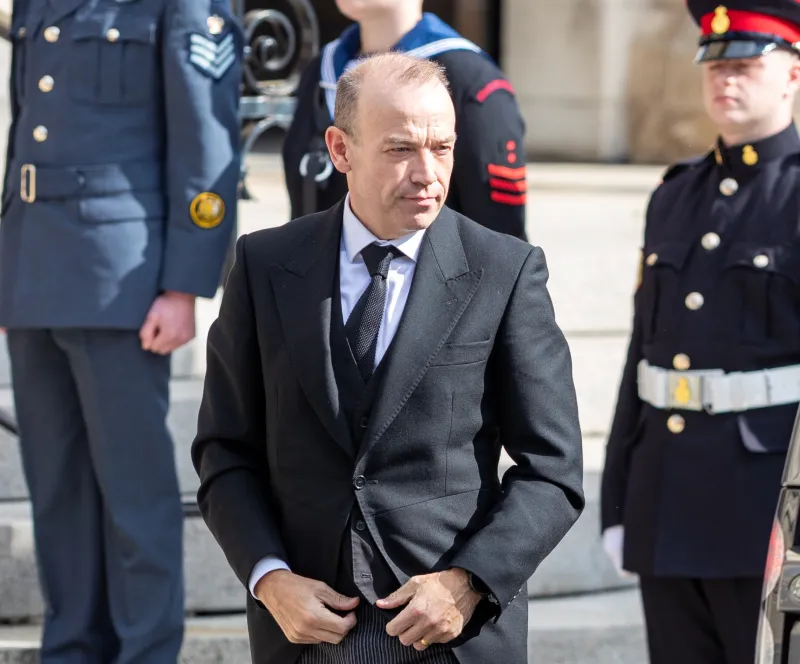
UK government funds abortion in Northern Ireland as pro-life groups object
 Secretary of State for Northern Ireland Chris Heaton-Harris arrives at St Anne’s Cathedral for the Service of Reflection in Belfast on Sept. 13, 2022. / Shutterstock
Secretary of State for Northern Ireland Chris Heaton-Harris arrives at St Anne’s Cathedral for the Service of Reflection in Belfast on Sept. 13, 2022. / Shutterstock
Denver, Colo., Oct 25, 2022 / 20:00 pm (CNA).
The U.K. government has announced funding to expand abortion in Northern Ireland, though the move drew strong objections from pro-life groups.
“The Department of Health is already straining under the current financial pressure, with thousands of people on waiting lists for genuine medical treatment,” Bernadette Smyth, director of the Belfast-based pro-life group Precious Life, said Tuesday. “Yet taxpayer’s money will be used for the killing of our unborn babies in Northern Ireland.”
“Every child deserves to be protected from the barbaric practice of abortion and every woman in an unexpected pregnancy deserves genuine life-affirming health care and support. Women in Northern Ireland deserve better than abortion,” Smyth continued. “Precious Life will continue campaigning to protect mothers in Northern Ireland, and restore personhood and full legal protection for their unborn babies.”
Chris Heaton-Harris, secretary of state for Northern Ireland, said Monday that the U.K. government will “ensure the commissioning of abortion services.”
“21 October marked the three-year anniversary of the decriminalization of abortion in Northern Ireland,” he said. “It is not right that three years on, women and girls in Northern Ireland are still unable to access the full range of health care to which they are lawfully entitled.”
Heaton-Harris said the U.K. government will ensure appropriate funding “to enable health care professionals to take the necessary steps to ensure that essential training and recruitment of staff can progress, and services can be implemented.”
The lack of abortion providers in Northern Ireland means women who are 10 weeks pregnant or more who seek abortions are still told to travel to England, Politico reported.
Right to Life UK said that once abortion services are fully commissioned in Northern Ireland, abortion will be available “up to the point of birth” for all disabilities including cleft palate, club foot, and Down syndrome. Sex-targeted abortion will be available through 12 weeks and abortion-on-demand will be available, de facto, through 24 weeks of pregnancy.
Though the Northern Ireland executive operating out of Stormont normally oversees the health department, at present there is no government due to the Democratic Unionist Party’s refusal to allow the filling of senior government posts after the victory of the Sinn Féin party in the May elections. This situation gives significant authority to the Northern Ireland secretary of state, who is a member of the U.K. prime minister’s cabinet.
The U.K. Parliament imposed legal abortion on Northern Ireland during a previous period of political deadlock. Since then, more than 4,136 abortions have been performed.
Heaton-Harris said the 2019 law decriminalizing abortion in Northern Ireland requires him to fully implement the recommendations of the 2018 report on the U.K. produced by the U.N. Committee on the Elimination of Discrimination Against Women. These recommendations include funding for abortion.
Pro-life groups criticized both the funding of abortion and the U.K. government’s action without local approval.
“Chris Heaton-Harris is not only ignoring the right to life of unborn babies here but also blatantly ignoring the principles of democracy and devolution by using his governmental powers to override the Stormont Assembly,” Smyth objected.
Sinn Féin and the Social Democratic and Labor Party (SDLP), the two largest Irish nationalist parties in Northern Ireland, had called for the commissioning of abortion last year. The traditionally Catholic-backed nationalist parties now tend to back abortion, while the traditionally Protestant Democratic Unionist Party has continued to strongly oppose abortion.
Smyth criticized SDLP and Sinn Fein legislators and others, saying they must be “called out for their deafening silence on this interference from Westminster — yet they are the first to claim democracy and devolution must be respected in other devolved matters in Northern Ireland.”
Catherine Robinson, a spokesperson for Right to Life UK, noted that three years ago Northern Ireland had “almost full legal protection” for unborn children.
“Since then, Westminster has forced abortion on the region against the will of the electorate and their representatives,” she said Oct. 24. “Now, the secretary of state for Northern Ireland has essentially been made a de facto unelected and unaccountable minister in Northern Ireland, who will commission abortion as he sees fit. A just society would be introducing greater protections for unborn children against abortion, not lessening the few that remain.”
Heaton-Harris, a Conservative Party member, was appointed Northern Ireland minister last month by U.K. Prime Minister Liz Truss, who has since resigned. Heaton-Harris on Tuesday was reappointed by the newly elected prime minister, Rishi Sunak.
In his Monday statement, Heaton-Harris said that funding abortion services is ultimately the responsibility of the Northern Ireland executive.


